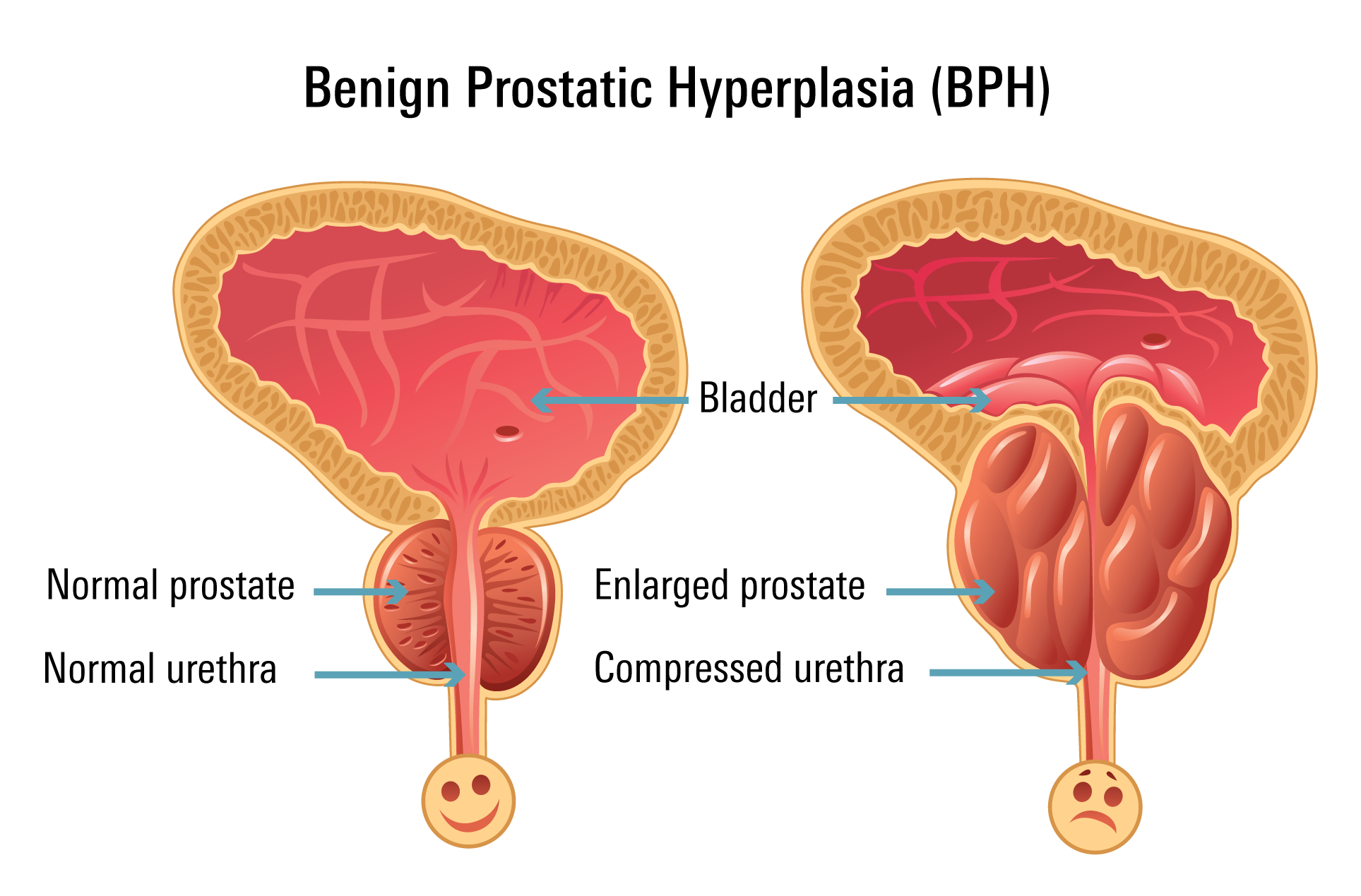Benign Prostatic Hyperplasia Medications
What is Benign Prostatic Hyperplasia (BPH)?
A male's urethra is surrounded by a tiny gland called the prostate at the base of the bladder. The prostate's primary role in the male reproductive system is to release fluid to join the seminal fluid that carries sperm.
Benign prostatic hyperplasia (BPH) or prostate gland enlargement, is caused by the expansion of certain cells (stromal and epithelial cells) in the prostate gland and affect how you urinate.
The layer of tissue that surrounds your prostate prevents it from expanding as it enlarges, which causes the gland to pinch the urethra. This leads to your bladder wall getting inflamed and thicker.
Even with a minimal amount of urine in it, your bladder starts to constrict and makes you pee frequently. Your bladder eventually becomes less sufficient and is unable to empty itself.
Normally, this growth doesn't present issues until around the age of 65 years.

What are the symptoms of BPH?
Many men with BPH experience no symptoms. But for the men who do, lower urinary tract symptoms (LUTS) are the major BPH signs and symptoms:
- Hesitation, irregular urine flow, straining, or a weak urine stream
- Urinary urgency as well as dripping or leaking
- Inadequate bladder emptying or persistently feeling like your bladder is full
- Frequency of urination, especially at night (nocturia)
BPH seldom results in more serious symptoms, but if the obstruction is severe, it may cause acute renal disease by causing urine to back up into the kidneys.
How is benign prostatic hyperplasia (BPH) treated?
Watchful waiting, medication therapy, or surgical intervention are all possible forms of treatment.
- Mild disease: is often managed with watchful waiting, which requires yearly reassessments of your condition.
- Moderate-severe disease: is generally treated with medications, and minimally invasive procedures, or surgery, such as transurethral resection of the prostate (TURP).
Medications to treat BPH
Alpha-blockers
This drug class of medications (selective and non-selective) is considered first-line for individuals with moderate to severe symptoms of BPH and may be used alone or in combination with another drug class called 5 alpha-reductase inhibitors.
These medications operate rapidly and immediately without shrinking the prostate, but it may take 4–6 weeks to determine whether they have had the desired results.
Alpha-blockers improve urine flow and reduce bladder outlet blockage by relaxing the smooth muscle in your bladder neck. They do this by blocking alpha-1 adrenergic receptors.
Non-selective alpha-1 blockers
These medications are generally given at bedtime to help reduce the initial “first dose” effect of orthostasis/dizziness.
- Terazosin: start 1 mg at bedtime (titrate slowly). 10 mg at bedtime is generally effective; the max dose is 20 mg at bedtime.
- Doxazosin (brand: Cardura, Cardura XL):
- IR (immediate-release): start 1 mg; titrate slowly up to 4-8 mg daily; generally taken at bedtime
- ER (extended-release): start 4 mg daily with breakfast; titrate to a max of 8 mg daily
Selective alpha-1A blockers
- Tamsulosin (Flomax): 0.4 mg daily, 30 minutes after the same meal each day; max 0.8 mg daily
- Tamsulosin + Dutasteride (Jalyn): 0.5/0.4 mg daily 30 minutes after the same meal each day
- Alfuzosin (Uroxatral): 10 mg daily, immediately after the same meal each day
- Silodosin (Rapaflo): 8 mg daily with a meal
Warning: If medication is stopped for several days or the dosage is increased too quickly, alpha-blockers have been found to cause orthostatic hypotension/syncope (dizziness or fainting after standing up) usually with the first dose. It has been shown that these drugs can also cause intraoperative floppy iris syndrome (IFIS) in individuals receiving cataract surgery who have previously taken alpha-blockers.
Side effects
Dizziness, fatigue, headache, abnormal ejaculation
5 Alpha-Reductase Inhibitors
This drug class of medications is used to reduce the size of the prostate, but their onset of action does not start quickly. They should not be taken in males with BPH who don't also have enlarged prostates.
5 Alpha-Reductase Inhibitors work by inhibiting the 5-alpha reductase enzyme, which blocks the conversion of testosterone to dihydrotestosterone (DHT).
- Finasteride (Proscar): 5 mg daily
- Dutasteride (Avodart): 0.5 mg daily
Contraindications: These medications should not be taken by women of childbearing potential, pregnant women (pregnant women should not take or handle these medications), and children.
Side effects
Impotence, decreased libido, ejaculation disturbance, breast enlargement and tenderness
Phosphodiesterase-5 Inhibitors
This drug class of medications reduces the growth of smooth muscle and endothelial cells, reduces nerve activity, and stimulates smooth muscle relaxation and tissue perfusion in the prostate and bladder.
- Tadalafil (Cialis) (Adcirca - used for pulmonary arterial hypertension): 5 mg daily, at the same time each day with or without a meal
- Tadalafil is the only FDA-approved PDE-5 inhibitor for the treatment of BPH.
- Warning: This medication may cause impaired color discrimination (color blindness), hearing loss, vision loss, hypotension, and priapism (persistent and painful erection).
- Side effects: headache, flushing, dizziness, blurred vision, muscle and back pain, increased sensitivity to light, diarrhea
Speak with your doctor
Your quality of life may be greatly impacted by benign prostatic hyperplasia (BPH), which may also increase your risk of contracting further illnesses.
Talk to your doctor about which treatment option is best for you and send your prescription to Marley Drug. Save up to 95% compared to your local pharmacy by using Marley Drug.